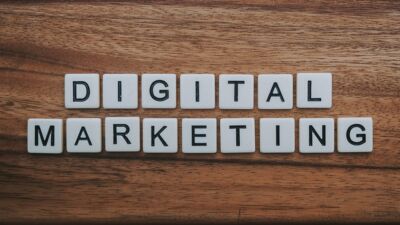What is Digital Marketing and How do I Learn it?

Digital marketing is the use of online technologies to deliver advertising and messages; endorse brands, products and services; engage current and future customers with a brand and integrate marketing communications. Digital advertising, social media, online brand reputation and websites each play crucial roles in the overall digital marketing landscape.
Digital marketing utilizes an omnichannel approach—where multiple mediums (channels) are used to implement a larger, holistic strategy to generate engagement geared toward an online goal. Thousands of channels exist for a marketer to utilize. These channels are often grouped into categories, such as online advertising, social media, brand reputation, email, websites and mobile.
Often serving as the hub for digital marketing strategies, a company’s website is one of the most crucial components. The company’s website is where primary revenue-generating goals take place. In many cases, this is the sale of a product or service paid through digital transactions. These e-commerce goals directly contribute to a company’s revenue, but many other goals exist on a company’s website, each often geared at different segments of the consumer’s journey. For example, signing up for an email newsletter is a goal many marketers use to increases consumer engagement. These revenue-focused and engagement outcomes are called conversions in digital marketing.
Digital marketers know that they must do more than put a website and hope someone converts. A marketer must utilize multiple techniques and strategies to increase traffic to their company’s site. By generating more traffic to the site, the marketer increases the opportunities for conversions. To generate traffic, the digital marketer will often use a combination of these strategies:
- Paid Search. Paid search, also known as pay per click (PPC), is advertising on search engine results placement (SERP) pages. Digital marketers utilize paid search as a mechanism to pair a consumer’s search intent with the products and services their company offers. Ads are charged when a consumer clicks on them, which results in the consumer being taken to a webpage that provides relevant content to the consumer’s search term. These pages, called landing pages, are most often designed to convert.
- Social media marketing. A strong social media presence provides a digital marketer with not only a built-in audience, but also an inspired audience who is willing and excited to engage with the company’s brand, products and services. Social media is often woven into the marketing efforts in a way that allows for sharing between peers in as many situations as possible.
- Search engine optimization (SEO). SEO is used by digital marketers to optimize content, the technical aspects website implementation and increase reach of their website through search engine results placements (SERP). By evaluating and understanding what consumers are looking for in search engines, digital marketers can focus the content they develop for their company’s website to match the keywords and phrases consumers use. This process increases the visibility and ranking of the company’s offerings and becomes a valuable and important start to a long-lasting consumer relationship and engagement.
- Email marketing. Perhaps one of the longest-used tools in the digital marketer’s toolbox, email is one of the quickest and most direct ways to reach a consumer. Brands know this, and continually have to evolve their email to stand out in a consumer’s cluttered inbox. Emails that are trustworthy, relevant, timely, conversational and coordinated with other digital marketing strategies are most likely to succeed.
- Mobile marketing. Most of us have a mobile device in our pocket, our purse or nearby every day. We check our mobile devices hundreds of times a day. Mobile marketing offers opportunities for digital marketers to highly segment and personalize messages directly to consumers through in-app marketing, SMS, MMS, geo-location advertising and more.
How do I Learn Digital Marketing?
Digital marketing is often a specialized course or track within a marketing academic program at many colleges and universities. In these courses, each of the channels are thoroughly analyzed to provide an understanding of their opportunities, when to use them and how best to use them.
At Concordia Nebraska, we offer BUS 368 – Digital Marketing. This class explores in detail many of the strategies and tactics marketers use in the digital world. Not only do students learn about these through reading and classroom discussions, they also begin to utilize various tools and techniques to dive deeper. For example, students in the class may choose to work on a project throughout the semester that culminates in the building of a website that utilizes user-centered design principles, houses content optimized for specific search keyword and is connected to Google Analytics to provide insights into usage, clickstreams and conversions.
In addition to classroom instruction, digital marketing is learned through practice. With a small amount of budget and time, one can try different tactics in the various digital marketing channels. For example, a marketer can set up a free blog on Wordpress and begin optimizing content and technologies to increase search engine optimization.
Many professional organizations offer training and certification in digital marketing as well. For example, the American Marketing Association offers a Digital Marketing Certification through online education for individuals that provides advanced knowledge and training on the latest digital marketing approaches.
Are you Ready for a Rewarding Career in Digital Marketing?
To start your path to a digital marketing career, check out Concordia's marketing program.
Frequently asked questions
How much do digital marketers make?
According to salary.com, the salary ranges for a digital marketer from $79,000-$150,000. On ZipRecruiter, it ranges from $44,000-$100,000 and on PayScale $45,000-$99,000. On average, the salary for an entry-level position would be around the $40,000, and a more experienced person would be making around $100,000.
How do you become a digital marketer?
Digital marketers often study marketing in college in marketing or business programs. Many programs offer course specific to digital marketing which include paid search, social media marketing, SEO, email marketing, mobile marketing and more. Internships in college also offer opportunities for learning real-world skills in digital marketing.
What is a digital marketing plan?
A digital marketing plan is the strategy and playbook a marketer will setup that outlines each of the channels and tactics used by each campaign. A digital marketing plan will include an overview of the campaign goals, and details of how each channel will be developed to increase opportunities for conversion. The plan will also include a budget schedule (for paid media), an implementation timeline and anticipated results.
Related Stories


